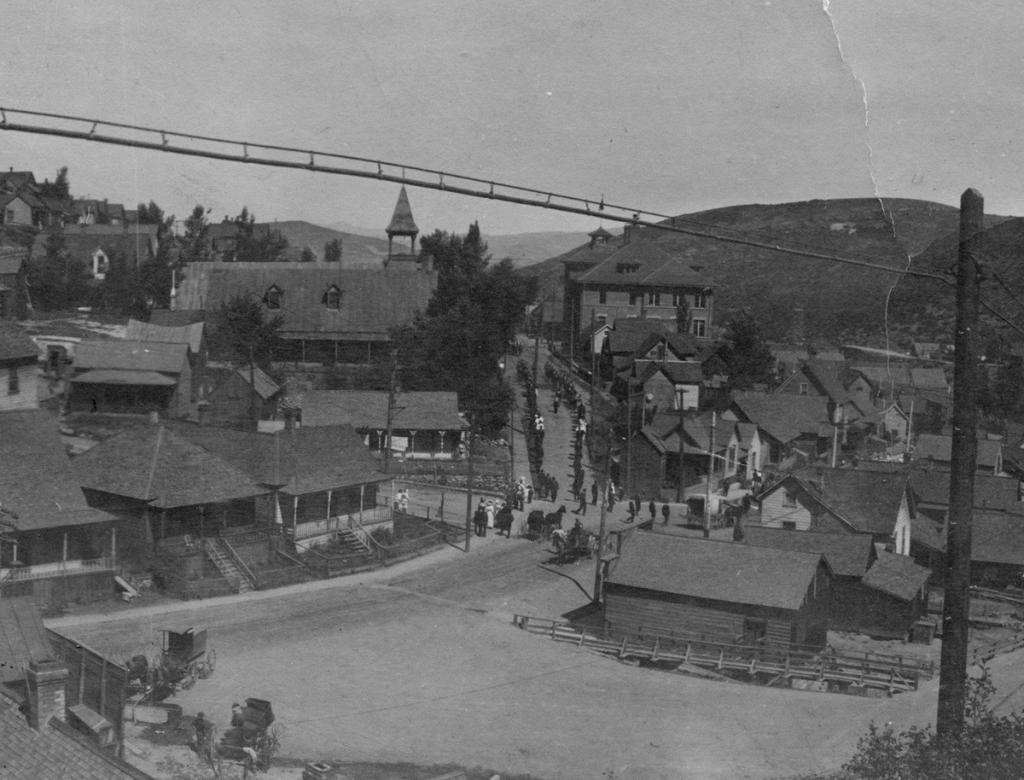In August 1914, Park City played host to the state firemen’s tournament and convention. Businesses and homes across town decorated for the occasion with flags, streamers, and miniature models of fire trucks and firemen.
The Park City Juvenile Band, officially formed by John C. Whitta just four months earlier, practiced and perfected their musical talent for performances at the welcoming ceremony. A tower was even constructed near the Marsac Mill in order to host a “Pompier exhibition,” or “novel” and “thrilling” demonstration of firemen’s skill and talent in the rigors of their jobs. Park City’s Mayor Tallon urged all citizens “to constitute himself a committee of one on reception and bureau of information for our visitors.”
The three-day tournament was a success. The crowds it drew to Park City were numerous enough that many claimed they had never been bigger. The Park Record did not confirm numbers, though several estimates noted at least 3,000 people attended the events of “the Big Day,” or final day of the tournament.
Firemen delegates represented eleven of Utah’s cities, including Salt Lake and Provo. Prior to the fun and games, they attended to business such as electing officers, approving meeting minutes, and discussing budgets. But the highlights for most in attendance were the sporting events and the carnival-like atmosphere.
August 20, the third and biggest day of the tournament, started with a parade, in true Park City fashion. Over 150 firemen marched in full uniform behind standard bearer and marshal Dr. E. P. LeCompte. Other parade participants included veterans of the Grand Army of the Republic, the Park City Independent Band and the Juvenile Band, a “burlesque fire department” made up of men in costume, and nearly 700 flag-waving children who earned a nickel for their efforts. The city even brought out its new chemical fire truck for the occasion.

Credit: Park City Historical Society and Museum, Emmett Wright Digital Collection
After the parade finished, everyone gathered at the ball field and various places around town for sporting contests, baseball games, strength competitions, and more. There were even competitions for the oldest fireman (R. Simpson), prettiest girl (Miss Elenor Wright), youngest baby (the nineteen-day-old child of Mr. and Mrs. Bud Johnson), and the “homeliest man” (Dick Squires). The categories were decided in jest and not even Squires felt “the least bit offended” as he joked that “jealousy had a great deal to do with the decision.” He won a pipe, bag of tobacco, and shirt, noting to all present that he wished to be “laid out in” the shirt when “summoned to climb the golden stairs to mingle forever in peace with the good and beautiful.”
One of the only hiccups of the day was when George Farnsworth, a fireman from Sandy, fell and broke his arm. Witnesses rallied and in the course of just a few minutes raised $66 to help with medical expenses. As the Park Record would have put it, such generosity surely spoke to the “public spiritedness” of Parkites.